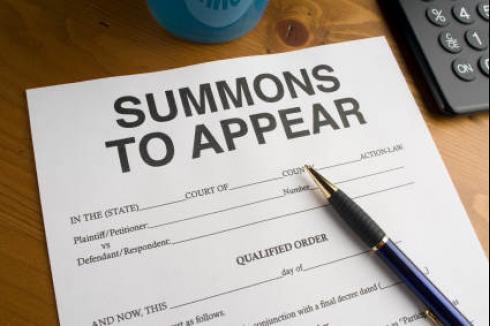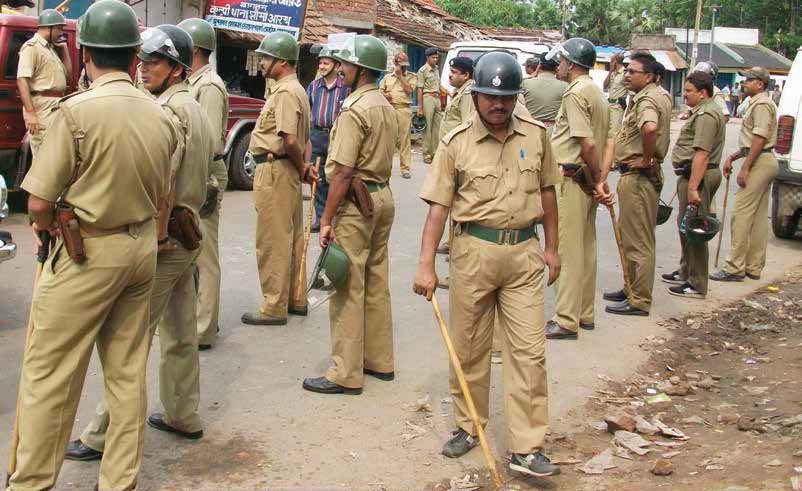This article is written by Gitika Jain, from Amity University, Kolkata. This is an exhaustive article which deals with the process to compel the appearance and production of things.
Table of Contents
Introduction
Something which violates penal law and is a positive or negative act or omission is called a crime. Crime is constituted when an evil mind thinks of doing something even when that is against the laws of the country. The concept of crime is as ancient as the human race and it has even grown to a far extent now. Crime can also be divided into the following categories:
- Cognizable and non-cognizable;
- Bailable and non-bailable;
- Compoundable and non-compoundable.
The process to compel the appearance
The basic requirement for the progress of the trial in crime is the appearance of the accused that has been defined under Chapter VI of the Criminal Procedure Code.
Summons
The most basic and mildest form of the process is the summons which may be issued in order to make a document or a thing appear. Summons are issued in duplicate under the seal of the court that is required to be conveyed by the police officer of the court or any public servant to someone personally.
Summons include the clear and specific title of the suit and place and includes date and time whenever a search appearance of a person or a thing is required.
A brief description of the charged offences is provided in the summons.
The power to issue a summons in the hands of the police which directs a person to be present for some investigations. Whenever corporation services are to be served, a summon is presented to the secretary or principal officer of that corporation address to the chief officer of the company. Summons can also be issued on banking sectors.
Whenever it happens that a person summoned on a specific day and the person does not appear, the person’s family male member are served the summons again who is required to sign the receipt whenever that person is found. But in cases where summons cannot be served according to the above-mentioned procedure, the person serving the summon shall appoint one of the summonses to be a part of the house.
Whenever a person to be given to someone is in any government service the court is required to send someone to the head of the office under which such person has been employed. Whenever the court does not have a jurisdiction to send the summon it may send it to the magistrate under whose jurisdiction the summon can be sent to the person where he ordinarily resides.
Whenever someone is sent to the witness it must be sent by registered post, the provision of which was inserted in 1997 in order to avoid any delay in service of such summons.
The procedure of sending the summons by registered post can also be adopted for sending someone’s to the accused and delay in service of the summons is the major factor nowadays for the delay in the process of the trials.
Where the offences in the world are bouncing of cheque, petty crimes, etc. sending summons to registered post may be avoided.
Warrant
Whenever a person fails to appear before the court on the said date after the issue of summons, he may be issued a warrant of arrest directly.
Unless and until the court which issues such warrant cancels it or unless the warrant has been executed the warrant of arrest shall remain in force.
The essential requirements of a valid warrant are:
- The warrant should be in a prescribed form and in writing.
- It should include the name and designation of the person who is executing it.
- It must provide the full name and description of the person to be arrested.
- It must include the offences that are charged against the person to whom the warrant is issued.
- It must be sealed.
- It must be signed by the officer of the court.
A bailable warrant may be issued to a person where there is the involvement of offence related to a minor case.
A warrant should always be directed to the person in charge of a police station. It can also be directed by the court if there is surety and security by a person that his attendance may be taken and he may be released on bail. Such warrants are called bailable warrants.
Execution of warrant can happen at any place in India by the way of a court which can send the warrant to the superintendent of the police residing in that area and having jurisdiction over that area.
Whenever there are reasons to believe that a person against whom the warrant has been issued is concealing himself, proclamation can be issued by the court which can be published in the manner which has been directed by the court including in the newspapers and other direct attachment of property. A receiver office property can also be appointed by the court. Whenever a proclaimed person appears the attachment can be cancelled and if the court has few reasons to believe the abscondment of the person or the person has not obeyed or will not obey their summons the warrant of arrest may be issued.
The controlling officers of the area where the police have sent the summons or warrant are required to know the position of the summons and warrants.
The process to compel the production of things
For the purpose of investigation and prosecution, the process of comparing the production of documents or a thing is necessary. it is because unless and until the document or a thing that is required to be presented before the court is presented the trial may be delayed.
Whenever a requirement is thereby the court or any officer in charge of the police station of the production of any document of thing that is necessary for the investigation trial enquiry or any other proceedings of the quote then someone may be issued or written order by an officer may be directed towards a person in whose position the document writing lies and require him to be present with the document or produced it any which ways.
The section which deals with the process to compel the production of things is void but the discretion has to be exercised very cautiously and judiciously.
There needs to be a direct connection between the offence and the subject matter. In the case of Lloyds Bank, there were charges of acquiring money by forging a cheque. Therefore the obtained money was deposited by the accused into the bank and there was a warrant issued for the seizure of money in the bank which was held to be improper. The bank was the owner of the money and only the accused possessed an actionable claim against the bank that cannot be produced in the court.
It was recommended by the law commission of India in its 37th report that the provisions of Bankers Book Evidence Act 1891 was not overridden by the sections compelling the production of things or documents. Two provisions of this Act provides that in case of any legal proceedings where the bank is not a party, the officer of the bank cannot be called to produce any accounts or books of the bank except by the order of the court.
The section also does not give power to the court to directly direct the banker for payment of money. In the case of Jagdish Prasad Sharma 1988, a banker was found absconding with the sum of rupees 100000 and as a result of which under Section 406 of Indian penal code a case was filed against him. The accused was therefore arrested and his passbook was seized. There was an order of the magistrate that directed the accused on the application of the proprietor to convert the cash in his account into a draft and produce it in the court; this order was held to be out of the jurisdiction.
Another important weapon in the Criminal Procedure Code for production of things or documents is the search warrant. This warrant is issued only when there are reasonable grounds for the court to believe that the person to whom it is to be issued will not or may not produce a particular document or thing. These warrants include a particular place or a part to be searched.
Permission of issuing warrant at pre enquiry stage is allowed and can be given. The search warrant cannot be exercised in a mechanical manner and search powers to issue the warrants cannot be given and the court is required to record the reasons for issuing such orders.
Even in cases of economic offences like Foreign Exchange Regulation Act (FERA) without proper representation in writing and production of authorisation from the director of enforcement, search warrants cannot be issued otherwise it will be held to be illegal.
According to Section 97 of Criminal Procedure Code, the court has the power to direct the search of the places where suspension regarding stolen property and forged documents are present and prove that process if any persons are found to be wrongfully seizing documents for a thing he may be called upon by the court.
The power to seize property is also in the hands of the police officer. The property has to be a list or suspected to have been stolen or suspicious of some offences. Magistrate under the jurisdiction has to be informed of such seizure.
In the case of PK Parmar v Union of India 1922, Central bureau investigation (CBI) issued to banks, directions for freezing the account of the petitioner who was alleged of opening an account in the name of his wife, sons and other family members and used it by forging their signatures. The forgery itself was the proof and pointed out using fingers against the petitioner and Delhi High Court rejected the order to quash the petition.
In case of DB Thakur v. State of Gujarat 1995, it was held by the Gujarat High Court that whenever there is a recovery from the possession of the accused on the search of narcotics substances the search cannot be vitiated because it did not cause prejudice by calling panchas. Here it is not a mandatory requirement of the presence of panchas.
Proclamation of offender and attachment of properties
Whenever a warrant has been issued against a person who has been absconding or concealing himself, and because of that search warrant cannot be executed or written, notice can be published by the court for the person to appear at a specified place and within a specified time that is not less than 30 days from the date of publishing such notice. After the issuance of such proclamation if the person again fails to be present at the specified place and time and he is avoiding himself from being arrested, the court can issue an order to attach his properties in order to compel the appearance of the person.
The warrant in lieu of summons
Whenever any summons is issued to a person, he is bound by the bond to appear before the court. Even after this if it does not appear the presiding officer can issue a warrant for the person to be arrested and to be produced before the court.
Conclusion
To sum up, following are the important sections:
- Section 91 deals with the production of documents.
- Section 145 to 149 deals with summoning the witnesses to produce a document or the thing.
- Section 204 deals with summoning an accused.
- Section 244 deals with summoning witnesses.
- Chapter 7 deals with the process to compel the production of thing wherein:
- Section 91 provides summons to produce a document or thing.
- Section 92 provides a procedure for letters and telegrams.
- Section 93 provides the functions when a search warrant may be issued.
- Section 94 deals with the sort of place that is suspected of being containing stolen property or anything of that sort.
- Section 95 deals with the power to declare certain publications that are forfeited and to issue the search warrants for the same.
- Section 96 deals with the application of the high court to set aside the declaration of forfeiture.
- Likewise, Section 97 to Section 105 deals with all the rest of the procedures involved in the process of compiling the production of documents or things.
References
- https://poseidon01.ssrn.com/delivery.php?ID=699064116031079107084119118099108025123011062088031092022073119100023099028120122089013000007026033049005008015122095087012102102026033060067066104018117065022094074002003007013018075069098097099075016103066089069116098005096072105069110112011119065027&EXT=pdf
- https://www.latestlaws.com/articles/all-about-process-to-compel-the-production-of-things-under-code-of-criminal-procedure1973-by-pinky-dass/#:~:text=The%2 0la w% 20regarding%20processes %20to,summons%20and%20a%20search%20warrant.
- https://devgan.in/crpc/chapter_07.php
- https://training.delhipolice.gov.in/PDF/PublicData/NEWS_20191127150123201.pdf
- https://shodhganga.inflibnet.ac.in/bitstream/10603/12751/13/13_chapter%204%20%20part%202.pdf
- https://shodhganga.inflibnet.ac.in/bitstream/10603/59725/12/12_chapter%207.pdf
LawSikho has created a telegram group for exchanging legal knowledge, referrals and various opportunities. You can click on this link and join:
 Serato DJ Crack 2025Serato DJ PRO Crack
Serato DJ Crack 2025Serato DJ PRO Crack











 Allow notifications
Allow notifications


